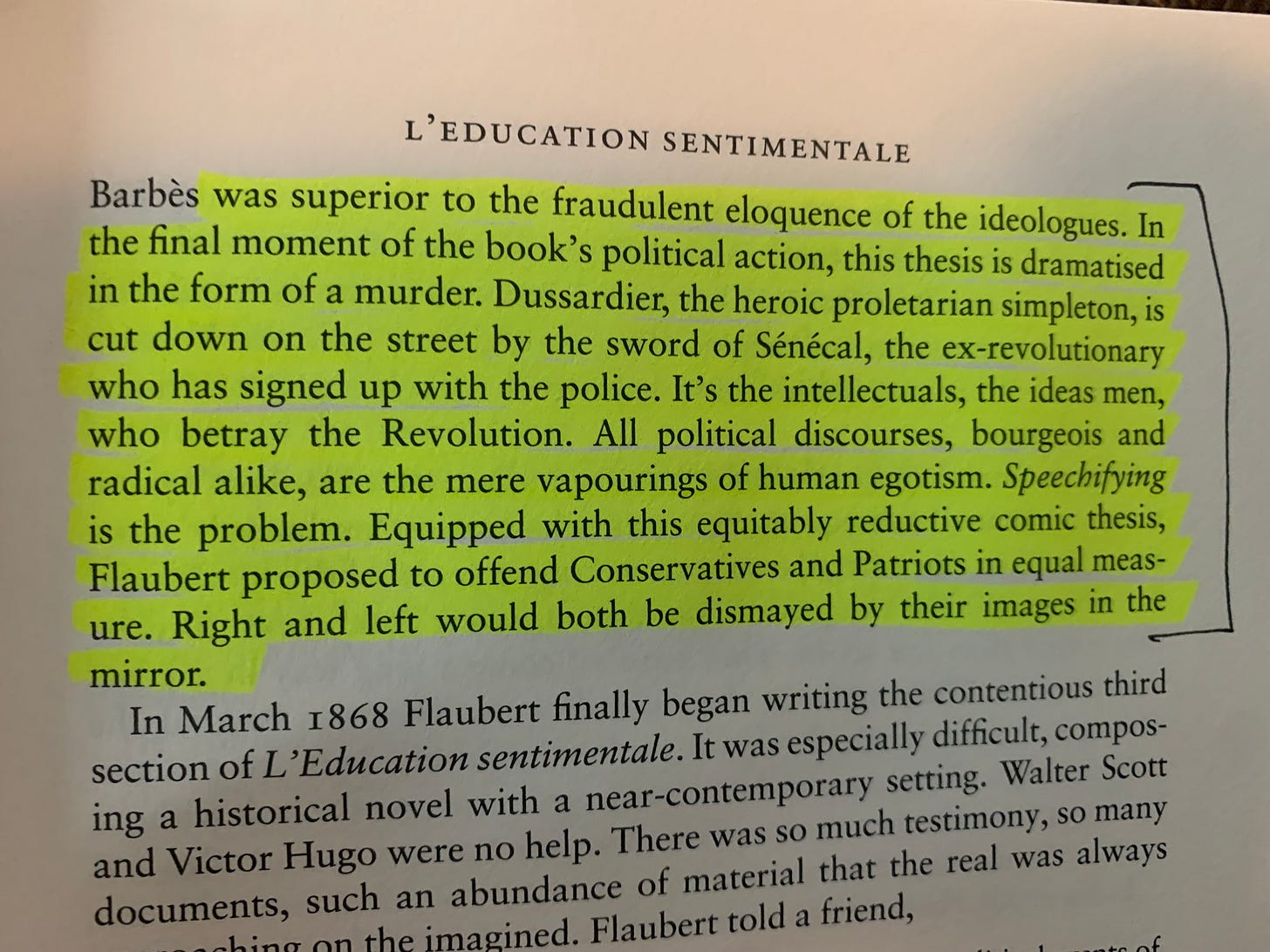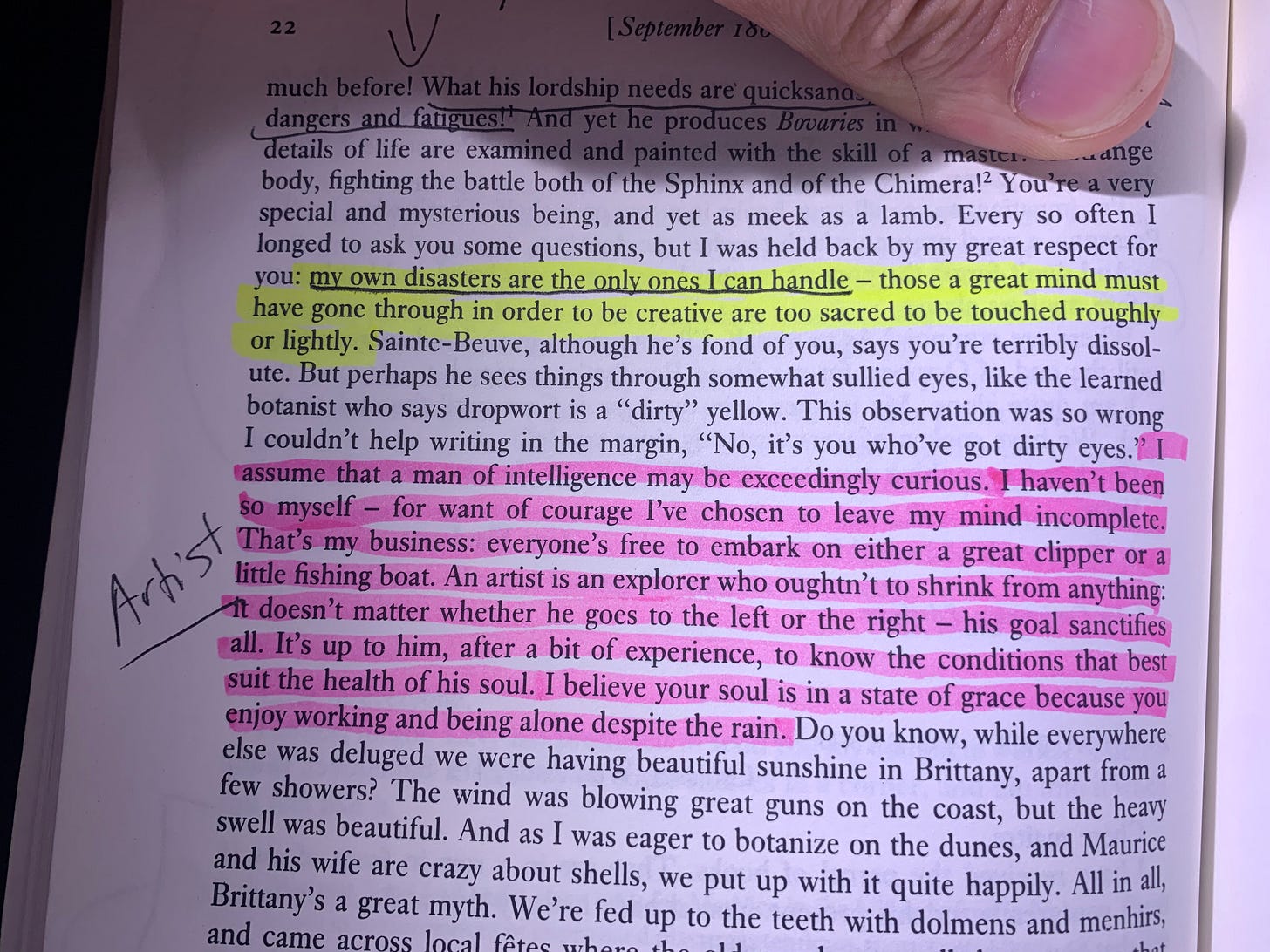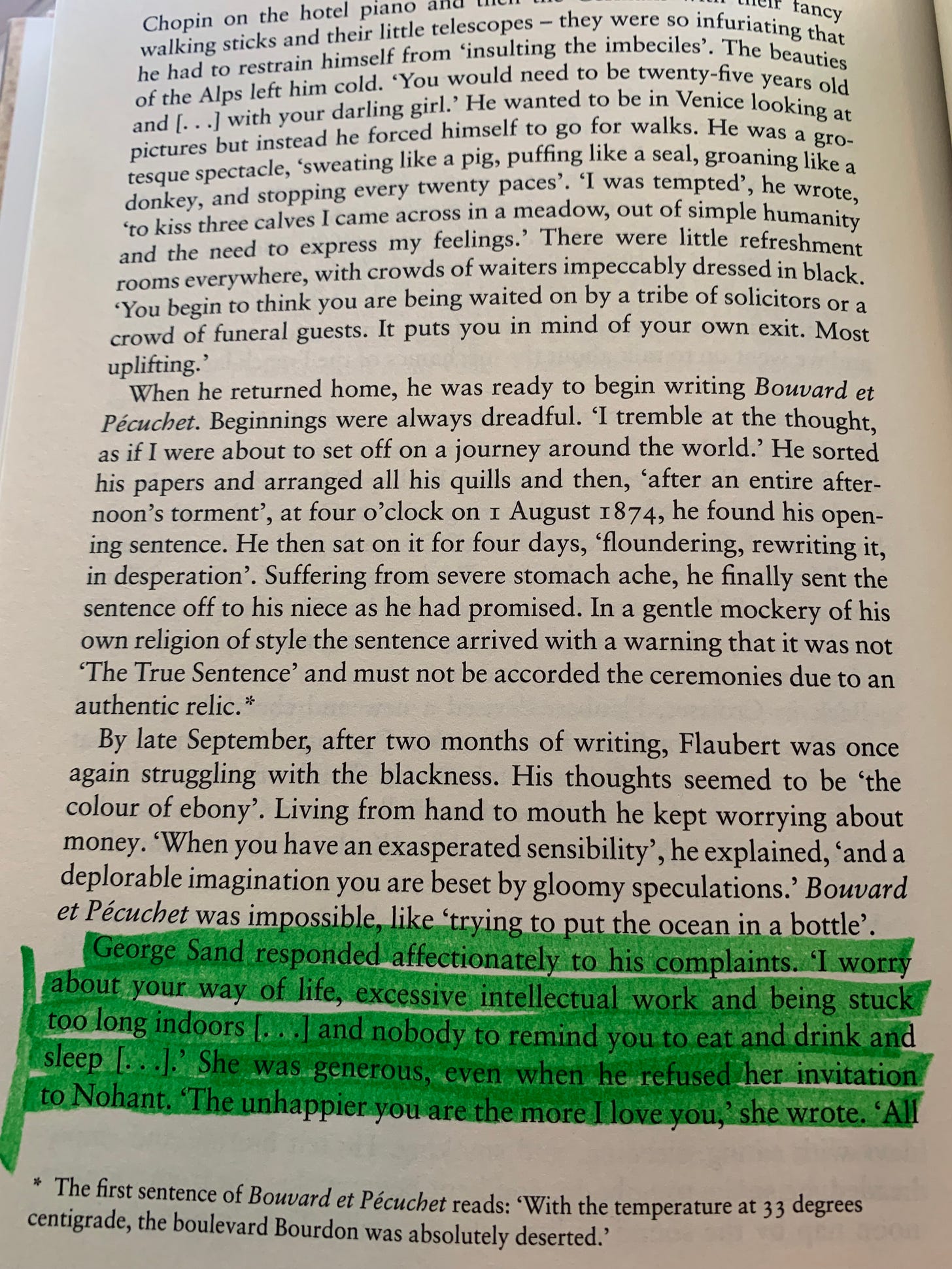Flaubert: Man of Artistry
The Savagery of The Artist
*Feel like supporting me?
First you can RECOMMEND Sincere American Writing.
Second, you can SUBSCRIBE
Third, you can GO PAID
###
I recently finished reading Geoffrey Wall’s 2001 biography, Flaubert: A Life. I’ve always loved reading biographies of people in general, but writers especially. It makes me feel less alone. Artists—writers—are often such lonely, solitary creatures, easily misunderstood, alienated, mocked, confused.
Flaubert (1821-1880), was a French Naturalist (or “realist”) writer who lived his whole life in France, moving around the country often but spending the bulk of his time in Croisset, south of Rouen, northwest of Paris in the northern section of the nation. Like FDR—the American president—much later, he never really worked a real job in his life. He went from grade school to high school to failing out of law school to his father’s inheritance to his mother’s trust fund.
Like his contemporary, the Russian novelist Fyodor Dostoevsky—strangely they were both born in 1821, died in 1880 and 1881 respectively and both suffered badly from epilepsy—Flaubert came from the upper-middleclass and spent most of his creative life decrying the “bourgeois.” Most artists—most people in general—seem to spend much of their lives pushing back against what they come from. For Flaubert, this meant his social class.
And yet, like myself, he both pushed back and also embraced his social position. Like Dostoevsky—who was not from money, but was expected to become an engineer and in fact graduated from engineering college—Flaubert was expected (by his father) to be a lawyer. But he failed out of law school. He even was expelled shortly before graduating high school (“college” they called it in Europe back then) and had to finish his studies at home, for open rebellion, and his father pulled strings so Flaubert could get his degree and move on. Ironically, a very similar thing happened to me with my Catholic, college-prep high school in Ojai, in 2002, due to booze and pot. (My English professor, still a dear friend, saved my ass.)
Flaubert’s father had been a successful, semi-famous doctor in Rouen, where Flaubert was born. His dad died when Flaubert was in his turbulent, anxious, wayward, uncertain early twenties. Starting at that point the young man took good care of his mother. Not long after this Flaubert’s sister died and he and his mother took in the child. (The father took off.) From a young age Flaubert was interested in reading and writing. By age 10 he supposedly read Don Quixote. He was precocious but lacked direction. He was characteristically (as most artists are) rebellious and free-thinking and contrarian. He was shaped by the 1830 Paris uprisings, and of course by the 1848 Paris revolutions.
Flaubert only wrote about half a dozen books. He took many years to compose a book, often writing, as he noted in his diaries and letters, 500 words a week. Slow. Thoughtful. Meticulous. Careful. Discerning. He was all about style and character, not plot like Dostoevsky. (Brilliant as Dostoevsky was/is.) Flaubert was more of a language man whereas Dostoevsky was more of a depth, symbol and universal metaphor man, his superb storytelling wrapped up in his detailed, philosophical asides and delicious, action-based, heart-pounding plots. (Read Crime and Punishment.)
Flaubert did things in his twenties which also remind me of myself. For example, he and a writing buddy of his did a three-month walking tour along the countryside of France, mostly along Brittany. They dressed like vagabonds, grew long beards, and saw the land and the people. This makes me think of my hitchhiking Kerouacian days wherein I thumbed across America and all over California and the Pacific Northwest. It also makes me think of my 450-mile walk in 2016 across El Camino de Santiago, in northern Spain.
In addition, he and the same buddy (Maxime Du Camp) traveled for 18 months around the Middle East, going to Egypt, down the Nile, to Israel, Alexandria, and other parts of “the Orient” and the “Near East.” This, of course, changed his perspective of life, travel, Europe, the Middle East, writing, etc. He came back and began working on what would become his first novel, Madame Bovary. Later this book created a huge splash—Flaubert came out of nowhere, exploding onto the literary scene in 1857—when he and the publisher were taken to court for indecency. Ultimately he won the trial and he became famous.
Flaubert suffered from feelings of depression, alienation, hostility to society, deep-seated anger, rage, resentment, fear. He isolated himself often. He loved nothing more than sitting alone at his writing desk, going at it for hours and hours with his pen, wearing one of his classic silk robes, the weather foggy, rainy and cold outside. Sometimes he spoke or even yelled aloud to himself as he wrote. At times he spent six, 12, even once 36 hours straight writing. He lived 25% in real life, 75% in his vivid imagination.
Flaubert did an insane amount of reading and research for his books. For Salammbo, his second book—about ancient Carthage—he read hundreds of books. He visited the ancient ruins in Tunisia. He wrote reams of writing just as research. He could plow through thousands of pages of reading in mere weeks. He was a prodigious reader, writer, thinker. His contrarian side pushed him to loathe people on “both political sides” and basically everyone else, too. He fervently believed—opposite of his good female writer friend, 17 years his senior, whom he compiled a lengthy, now published correspondence, George Sand—that true Art should hold no political options and should solely be concerned with aesthetics. (Rare today.)
Like Jack Kerouac much later—a fantastic writer but a half-wit compared to Flaubert, let’s be honest—who loathed the media-taunted “King of the Beats” title, Flaubert rejected out of the hand the notion of being, as it were the king of the Naturalists or Realists. He did, however, try to put down life “as it was.” This is especially evident in his brilliant novel, Sentimental Education, which covers Paris and rural France in the 1830s and 1840s during the revolutions and the chaos surrounding King Louis Phillipe and the Napoleon descendants.
Flaubert ultimately wanted to be seen as what he was: A non-political, serious Artist. For any time and any place this is a Big Ask. Artists have never been taken particularly seriously, with notable exceptions such as Shakespeare, Dickens, Didion, Sontag, Mailer and some others. Even when they’re taken seriously by literary circles they’re rarely taken seriously by “the masses.”
Flaubert, predictably, was also fairly spoiled, a bit of a mamma’s boy, hyper-sensitive (especially to criticism of his work), and deeply afraid of women. He liked having sex with women, and he even liked artistic discussions and letter-writing with women. And to some degree later in his life he came to some terms with his “feminine side.” But he never married, and he never gave himself up to any woman. Louise Collet—a woman writer he had a complex, long-winded relationship (affair) with on and off for many years—could and did attest to that. The Freudian explanation would surely be that he gave all his sexual energy in the form of filial love to his mother, who he took care of on and off all his life. And his niece, Caroline.
Flaubert mocked and loathed the aristocracy and the 2nd and 3rd Empires in France and yet he later courted the Napoleons and was invited to participate in High Society, which he very much did. He claimed to be a supporter of the socialist goals behind the 1848 Revolution and yet he mocked the immature idealism of the Fourierist socialism which the young far-left angry fighters for justice yelled about. Simultaneously he didn’t quite believe in Democracy. Like Alexis de Tocqueville, who wrote Democracy in America (1835), Flaubert worried that the “stupid masses” would ruin society. Too much voting power of The People would end civil society as they knew it. No, they needed a well-educated, intelligent, erudite aristocracy to ultimately steer the ship of State.
Flaubert suffered from epilepsy and sometimes had terrible attacks. He also had Syphilis, a common STD back then, from sex with prostitutes. Later in life, after his mother’s death when Flaubert was 50, Mom’s money left not to him but to his niece, his stress shot through the roof, especially around his terrible financial debts. (He’d never been good with money.) He probably died from some combination of epileptic seizure, stress-induced heart attack, and resulting physiological issues due to Syphilis. His niece ended up managing his money for him during the final years of his depressed, angry, sad, gloomy years, a fact that made him all the more lugubrious.
The famous French 19th century writer always said that a writer doesn’t choose his subject; his subject chooses him. Ditto fate. Humans had little control over the course of their lives; things happened and they responded accordingly. Like Bob Dylan with his poetry, it just sort of “came” to him, as if from above. This is, of course, the classic mark of otherworldly genius. He was simply a receptacle of creative power. He did the hard contextual work: Reading, traveling, researching for weeks and months and years. But then it all just roared out of him in a fireball of anarchic prose.
For Flaubert, Art was never about money. He criticized George Sand in this regard, and ditto his literary mentor and hero, Victor Hugo. In both cases, with both authors, he admired their work and yet also felt that, at times, they sacrificed too much to the petty masses, the popular reader. Flaubert, if anything, had intense “artistic integrity,” something we see very little of nowadays in our time, sadly. He did not bend to popular demand, or to political ideology or to what might “sell.” He wrote what he wrote because it felt immediate and hot and necessary; when his subject found him, he did its artistic, almost fascistic bidding. Art was for him authoritarian, not democratic.
There’s a lot of myth around Flaubert: His parrot in his waning years; prodigious sex with prostitutes; his rages and contrarian nature; his obsession and even one might say addiction with literary style over all else; his herculean discipline when it came to his craft; his semi-misogyny and yet his love for women, particularly his mother, his niece and George Sand, among others.
One might call to mind later 20th century male writers such as Charles Bukowski or Norman Mailer as being Flaubertian. Lifestyle-wise they both more or less fit. Writing-wise Mailer, also a consummate stylist, fits much more than the non-verbose, hyper-simplistic Bukowski (who was nevertheless brilliant). Kerouac one imagines would have been called a hack and a non-artist and a “writer” versus an Artist by Flaubert. Something to that effect. Flaubert aimed outward while always remaining an inner writer. Meaning that he explored the deep space of the human internal world. His subject was the inside of Man’s human condition. The title Sentimental Education seems perfect in more ways than one.
In the end Flaubert was a deeply sensitive, wholly wounded man, yet a man who taught us so much not because of his external bravery, but because of his internal artistry. He explored the places most people do their best to escape, to flee, to run away from as fast as they can. Now, as then. This, probably, besides the gorgeous language, is certainly why I am so attracted to his writing. He does not run from What Is. He sits there, right in front of the mirror, and forces us to look. Another author that comes to my mind, another Russian, is Nabokov. Perhaps this is a better 20th century example of a Flaubert-like man and thinker. (And prose-stylist.)
Whatever failures Flaubert possessed—and there were many—he paved the way for so many more authors to come. And he showed us how to look at what disturbs us internally, that monstrous, absurd thing deep within us that none of us can ever truly escape. He did not live to reach age 60, nor to reach the start of the 20th century. But he paved the road for the rest of us to get there.









"All political discourses, bourgeois and radical alike, are the mere vapourings of human egotism. Speechifying is the problem."
💥
Writers biographies are awesome. I've built up a pretty sweet collection myself. I see it the same way as Americans reading about Jefferson or Lincoln, Italians reading about Garibaldi, Poles reading about Kosciuszko and Pilsudski, Brits reading about Henry VIII or Churchill and the French reading about Napoleon or Charles de Gaulle. I'm especially looking forward to reading Worthens biography of DH Lawrence, where in the very first pages of the introduction he demolishes the anti-Lawrence narratives that have dogged his reputation in one fell swoop.